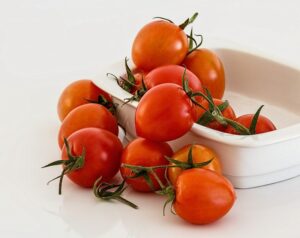Tomato month is here! Although imported and hothouse varieties have teased us for a month or more, August has finally arrived when we can enjoy local homegrown tomatoes!
Gardeners throughout the valley have been tending plants since April or May in anticipation of the fruit that is now ripening! They have fertilized, weeded, sprayed, and staked in the expectation of those scrumptious red delicacies.
Several years ago, a tomato plant began to grow near a drain vent in my backyard. This volunteer had likely been planted by a passing bird the summer before and when the soil warmed sufficiently, the seed sprang to life. As I trimmed after mowing each week, I was careful to spare this most sacred plant and looked forward to its day of fruition. 
It grew and grew and grew. In fact, that tomato plant grew larger than any I’d ever seen before or since. I was certain there would be enough fruit from this one plant to fill many sandwiches and numerous jars.
But it never happened. Not one bloom ever appeared on the plant and consequently not a single fruit was ever produced. At the end of the summer, I pulled up the enormous still-healthy plant and tossed it on the compost pile in disappointment. I have a photo somewhere of me holding this monstrous vine by the trunk and its many leaves and branches flowing downward. But you can’t eat vines and there are no blue ribbons for the largest bush.
I was baffled by this strange occurrence until I talked to a seasoned gardener. One possibility he suggested might have been a seed that came from a hybrid which are sometimes unproductive.
But I discovered another possibility as well. In order to produce fruit, tomato plants must experience some stress. Although they can’t think, they possess some mechanism that senses the eventual approach of frost that triggers them to bloom and produce fruit before the cold kills them. Unbeknownst to me, this well placed vine made the most of both the water and the rich nutrients supplied by the drain and continued to grow and thrive with virtually no stress.
Unlike most tomato plants that sense slight changes in nutrition, water, and temperature, this particular vine was living in fat city. Sadly it never got the message of impending doom and lived its whole life consumed with its own largeness. Ultimately it failed at the very purpose for which it had been created. Thank God for others who were able to supply my tomato addiction through their generosity.
Although disappointing at the time, this experience has helped me through some difficulties in life for the need for some stress in order to be productive often proves true for humans as well. Important personal growth and lasting good fruit almost never occur during lush times, but rather during hardship and strain. Too many good things nearly always lead to fruitlessness and lethargy. Although we yearn for problem-free days, such conditions tempt us toward stagnation while we enlarge our own territory rather than intentionally yield good fruit.
No matter our age, each of us should live with the realization that winter is coming. None of us will live forever on this earth and one night our frost will hit. This truth should prompt us to be as productive as we can possibly be now before we rest from our labors. Jesus reminded us of this in John 9:4 where He said, “As long as it is day, we must do the work of Him who sent me. Night is coming, when no one can work.” Although we shouldn’t be depressed about our mortality, its inevitability should motivate us to do all we can while we can to bear much fruit for the Master Gardener.
Too often we put off important personal growth, significant generosity, or intentional benevolence naively believing that we have unlimited time. One glance at our now heavy laden tomato vines should convince us otherwise, for they “know” frost is coming.
If there is some good you intend to do, do it today. If there is some important conversation you need to have, schedule it now. If you haven’t committed your life to Jesus, don’t put it off, for frost is coming. Let’s allow our stresses to remind us of this and make the most of the opportunities we have to bear fruit while yet we can.
Summer blessings, George